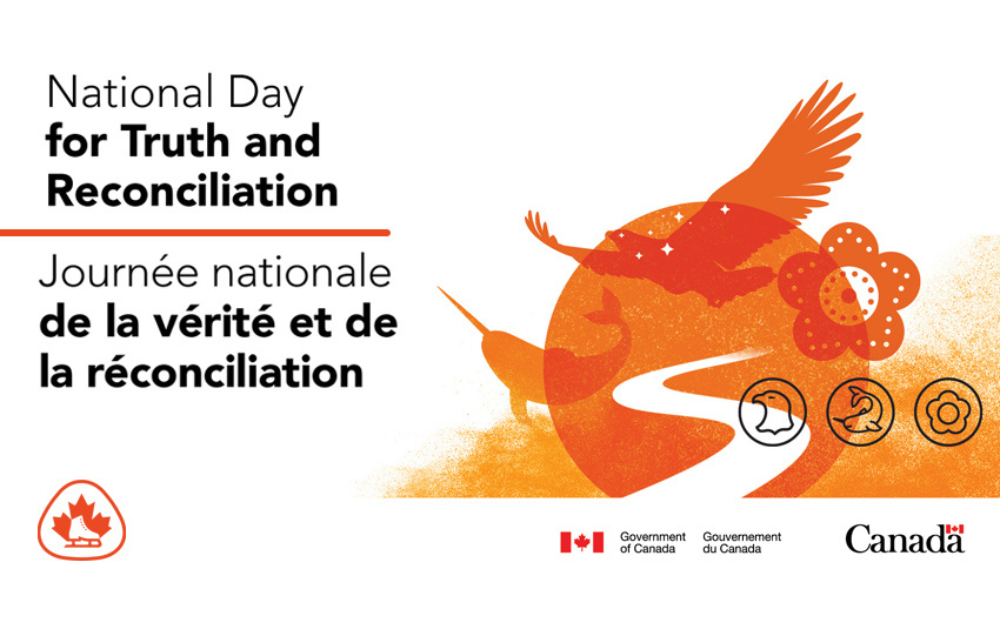Honoring Survivors and Remembering the Past

September 30th is a significant day in Canada, marked by two important observances: Orange Shirt Day and the National Day for Truth and Reconciliation.
Orange Shirt Day began as a grassroots movement to honor Indigenous children who were sent to residential schools in Canada, where they faced abuse and were stripped of their culture. The day is named after Phyllis Webstad, a residential school survivor who had her orange shirt taken away on her first day at school, symbolizing the loss of identity and self-worth that many children experienced.
Wearing an orange shirt on this day has become a powerful way to show support for survivors and to acknowledge the injustices of the past. It’s a time to listen to the stories of survivors, educate ourselves about the history and legacy of residential schools, and reflect on the ongoing journey toward reconciliation.
The National Day for Truth and Reconciliation was established by the Government of Canada to coincide with Orange Shirt Day. It is a National Day of Remembrance and reflection, where Canadians are encouraged to engage in activities that promote understanding and reconciliation with Indigenous peoples. This day is part of Canada’s broader commitment to acknowledging the painful history of residential schools and working towards healing and justice.
For newcomers and refugees, these observances offer a profound opportunity to learn about Canada’s history and to stand in solidarity with Indigenous communities. Participating in local events, listening to Indigenous voices, and wearing an orange shirt are meaningful ways to contribute to this important dialogue.
Let’s take this day to educate ourselves, honor the survivors, and commit to the ongoing process of reconciliation in Canada. We encourage you to do something this year in recognition of this important day.
Here are some Reminders & Resources to get you started:
- Attend Events to honour National Day for Truth and Reconciliation: As we enter September, there will be many events scheduled across Canada leading up to September 30th to honour National Day for Truth and Reconciliation. This is an opportunity to engage with communities and deepen your understanding of reconciliation. Keep an eye out on social media for updates!
- Read the Truth and Reconciliation Commission of Canada’s Calls to Action Report: The TRC was established to document the history of residential schools and provide recommendations for reconciliation. The TRC’s Calls to Action Report outlines specific actions for government, communities, and individuals to take towards reconciliation. After reading the report, ask yourself, “What actions can I take?”
- Know Whose Land You Are On: As non-Indigenous individuals, it’s important to recognize that we are settlers on colonized land. To learn more about the original caregivers of the land and the history of Indigenous treaties and communities across Canada, visit Whose Land. This educational tool and interactive map provides videos of appropriate land acknowledgments and answers to frequently asked questions. Additionally, the Canadian Association of University Teachers (CAUT) offers a Guide to Acknowledging First Peoples and Traditional Territory.
- Be Culturally Sensitive: The trauma of residential schools is both past and ongoing. Be mindful of the content you share, post, or discuss, as it may be triggering for Indigenous Peoples. Sensitivity is crucial in all interactions related to this subject.
- Understand Allyship: Allyship to Indigenous Peoples involves understanding responsibilities and acting respectfully. The Ally Bill of Responsibilities, outlined by Anishinaabe-kwe scholar, is a valuable resource for anyone wanting to support Indigenous communities effectively.
- Deepen Your Understanding of History: The University of Alberta offers a free 12-lesson course called Indigenous Canada, which explores key issues facing Indigenous peoples today from a historical perspective. Another valuable resource is the 4 Seasons of Reconciliation, a multimedia course from the First Nations University of Canada, which provides insights into the history and culture of Indigenous communities in Canada.
These resources offer a pathway to further understanding and active participation in the ongoing journey of truth and reconciliation in Canada.
